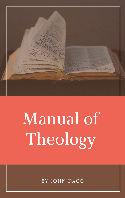Pollock The Doctrine of Christ is a single chapter work of 28 pages looking at different aspects of the Doctrine of Christ.
THE DOCTRINE
of CHRIST
2 John 1:9-11
By A. J. Pollock
THE CENTRAL BIBLE TRUTH DEPOT,
11, Little Britain, London, E.C.I.
Table of Contents of Pollock The Doctrine of Christ
This work is a single chapter work of 28 pages looking at different aspects of the Doctrine of Christ.
https://www.brethrenarchive.org/media/358132/pollock-a-j-_-the-doctrine-of-christ.pdf
Pollock The Doctrine of Christ
Contents
Download
Pollock-Doctrine-of-Christ.pdf (176 downloads )Excerpt from the work
WHAT IS THE DOCTRINE OF CHRIST?
Without in any way setting up a creed, it is very evident it would cover the truth of the Lord’s Deity, His true Manhood, His sinless life on earth, His atoning death on the cross of Calvary, His resurrection from among the dead. His coming again, the testimony of Christ to the Scriptures, and of the Scriptures to Christ. It is very evident “the doctrine of Christ” is something very vital and fundamental concerning the Person of our Lord Jesus Christ.
* * * *
JESUS IS GOD
The very name, JESUS, given to our Lord by the angel when intimating to the Virgin Mary the high honour God was putting upon her, in choosing her as the vessel of the Holy Spirit of God in bringing the Saviour into the world, intimated His Godhead. The meaning of the name, JESUS, is Jehovah-Saviour. JEHOVAH is one of the great names for God in the Old Testament, the One, who ever was, who ever is. who ever will be, the Eternal Present. Jehovah of the Old Testament is Jesus in the New Testament.
Prophecies in the Old Testament concerning our Lord are clear and definite. We read,
“Behold, a virgin shall conceive, and bear a Son, and shall call His name IMMANUEL.” (Isa. 7:14).
Here was something that had never occurred in ail the history of the world, that a virgin should bear a child. Immanuel signifies God with us. We read the answer to this in the New Testament: —
“Now all this was done, that it might be fulfilled which was spoken of the Lord by the prophet, saying, Behold, a virgin shall be with Child, and shall bring forth a Son, and they shall call his name Emmanuel, which being interpreted is. “God with us.” (Matt. 1:22, 23).
Still more fully does the prophet unfold his theme. We read,
“Unto us a Child is born, unto us a Son is given; and the government shall be upon His shoulder: and
7
His name shall be called Wonderful, Counsellor, The mighty God, The everlasting Father, The Prince of Peace.” (Isa. 9:6).
No man, uninspired of God, would have dreamed of penning such words. On the surface they appear to contain a contradiction. Who would have dared to prophesy that a Child of days should be at the same time “The everlasting Father”? Or that an Infant in the manger of Bethlehem should be at the same time “The mighty God”?
Yet how true is this prophecy, wailing until seven long centuries had passed before being fulfilled in the birth of our Lord. One of the names given to this Child is “Wonderful” [Hebrew pele], meaning something not to be grasped or understood]. The same word is used when the Angel of Jehovah (in this case clearly the Lord Himself), appeared to Manoah and his wife, prophesying the birth of a son.
When Manoah, wishing to show homage to the heavenly Visitor, asked Him His name, the reply was given,
“Why asketh thou thus after My name, seeing it is secret [Hebrew pele]? (Judges 13:18}.
We get the full answer to this in the New Testament, when our Lord said,
“All things are delivered unto Me of Mv Father: and NO MAN KNOWETH THE SON BUT THE FATHER” (Matt 11:27).
Here is plainly stated what was wrapped up in the words, “Wonderful” (Isa. 9:6), and “Secret” (Judges 13:18), viz., the inscrutability of the Person of our Lord, a mystery only knowable to the Father and the Son. No creature mind, however penetrating, can ever remotely understand this mystery of mysteries. It is the transgressing of Scripture that is responsible for all the heresies concerning the Person of our Lord, that have afflicted the church of God, occasioning such widespread havoc. It is sufficient for us to receive the testimony of Scripture that our Lord is very God, is very Man, united in One in Christ. Let us welcome every item of testimony to our Lord found in the Scriptures, but let us take care not to speculate, to
8
add to Scripture, to take from Scripture, or try to explain to our hurt what neither angel nor saint can ever fathom.
* * * * *
JESUS IS THE SON IN THE UNITY OF THE GODHEAD
The very first verse in the Bible ascribes the creation of the universe to God. His Being is stated, but no explanation as to His Godhead given. From the very first this was manifested in the mighty act of creation. We read,
“The invisible things of Him from the creation of the world arc clearly seen, being understood by the things that are made, even HIS ETERNAL POWER AND GODHEAD.” (Rom. 1:20).
In the light of the development of doctrine in the Scriptures we recognize that the Three Persons of the Godhead — Father, Son, and Spirit — were included in the name God, in Genesis 1:1. This we will proceed to show.
It may not be widely known among English-speaking people, unacquainted with the Hebrew language, that the name of God in Genesis 1:1, and throughout that chapter, is in the PLURAL number. That may be apparent to even a careful English reader when he comes to Genesis 1:26 and reads,
“Let US make man in OUR image, after OUR likeness.”
This is still more remarkable when we learn that the Hebrew language contained THREE numbers: —
SINGULAR = one only.
DUAL = two only.
PLURAL = three at the least, or more.
We thus see how very striking it is that the name, God, in Genesis 1:1, and throughout that chapter, is always in the plural.
And further in Genesis 1:1 the word, God (plural) is followed by a singular verb. Surely Moses could not have written such words except under the direct inspiration of the Spirit of God. The plural noun followed by a singular verb preserves the thought of the UNITY of the Godhead.




 Anthology on the Antichrist
Anthology on the Antichrist
